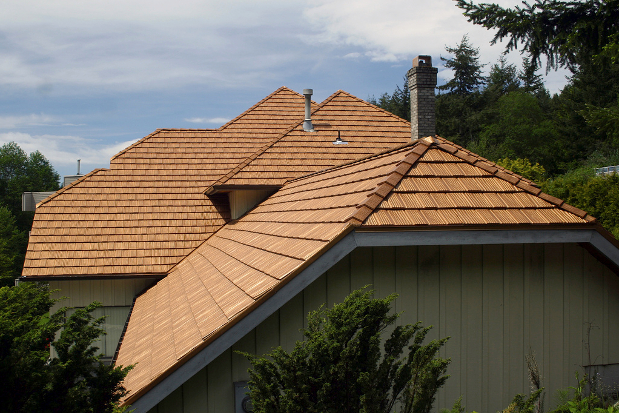
When you hear the words “metal roofing” your imagination may immediately conjure up images of old-fashioned tin roofs, rustic and ridged. However, there have been major advances in the design and construction, thereby making these roofs more elegant, durable, and an increasingly popular choice among homeowners. In fact, there are now several options available to customers depending upon the look you want. Often consisting of recycled metals—such as copper, tin, aluminum, and stainless steel— these surfaces can even be designed to imitate traditional shingles, while still offering a sleek, modern twist.
Durability
Metal roofs are known for their toughness. In fact most of the time they come with a 30-50 year warranty and typically survive through the duration of any housing structure. Plus, they’re extremely light-weight compared to conventional shingles, which makes for quick installation. This allows them to be laid over any pre-existing surface and removes the need for wasteful, time-consuming demolition. Here are some other resilient benefits of metal roofing:
Resistance: Due to their sturdy composition, they can withstand any kind of weather. Whether it is hurricane winds, pesky insects, or heavy precipitation, they can endure any climate. Plus, they’re rot-proof and rust-resistant (if properly galvanized).
Fireproof: They are non-combustible, which could save you some money on your insurance premiums (unless they are laid over pre-existing flammable materials, such as wood shingles). And no, they are no more susceptible to lighting (lighting strikes at any high point no matter the material, but if this includes your home, you may want to think about investing in a lighting rod).
Watertight: They’re perfect for sealing out any water. And due to their slick surfacing, snow buildup can slide off quick and easy.
Energy Efficient: They reflect light during the summer, saving money on utility bills. And though insulation is not extensively used in metal roofs, there ought to be a gap between exterior surfaces and the roofing structure. During the winter, this gap provides ventilation and interior thermal reflectivity to help deflect heat back to your house.
Ready to start your Metal Roof Installation?
Find ProsPrecautions
Of course, like any roof, they’re not perfect. But even their inherent downfalls can easily be avoided.
Expense: They’re not cheap (usually $200-$500 per every 100 square feet). But since they’re so durable, if you plan on living in your home for an extended period of time, there will be a surefire return on your investment (this also adds value to the home).
Noisy: When it pours, it’ll sound like someone’s drumming on your house. But there are ways to deaden the noise: soundproof insulation or sheathing are two options.
Denting: Usually they are more prone to hail damage, but some products guarantee against denting, even against foot prints.
Slippery: Although their slickness can be beneficial, if you have to walk on top of your house, you may have to watch your step. But some metal roofs are textured in order to help imitate the look of asphalt shingles and therefore act as a slip guard as well.
Maintenance & Hiring Roofing Contractors
Metal roofing is virtually maintenance-free and easy to clean. But it can also easily be scratched or dulled. And if it’s painted (which it usually is) it can also chip, so it’ll need to be recoated every couple of years. And even though they’re typically leak-proof, seepage can occur around joints and seams. However, if there is seepage, it’s usually not due to leaks but condensation that’s formed underneath the surface because of improper ventilation during installation. So for the initial installation and bigger repairs, make sure you hire a qualified roofer who has experience with metal roofing. This is an uncommon surface, which is part of its appeal, but it also means they require a specialist who is trained in understanding their unique construction and habits, such as their tendency to expand and contract over time.
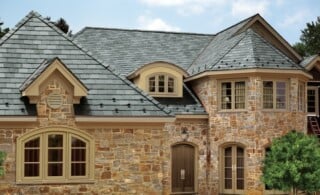 Best Asphalt Shingles – A Buyer’s Guide
Best Asphalt Shingles – A Buyer’s Guide 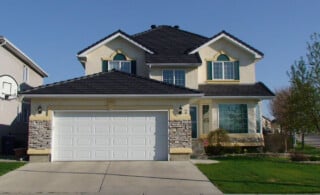 Rubber Roofing – Benefits & Alternatives
Rubber Roofing – Benefits & Alternatives 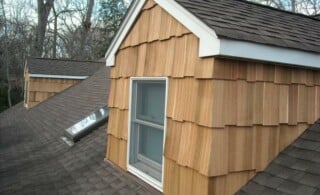 Should You Layer Shingles on Your Roof?
Should You Layer Shingles on Your Roof? 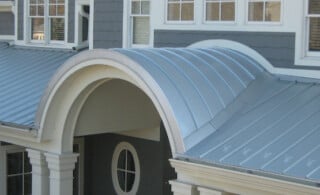 How to Keep Your Metal Roof Healthy
How to Keep Your Metal Roof Healthy 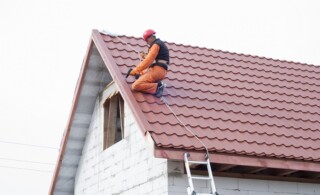 How to Find & Fix a Leaking Roof
How to Find & Fix a Leaking Roof 

Are You Familiar With This Topic? Share Your Experience.